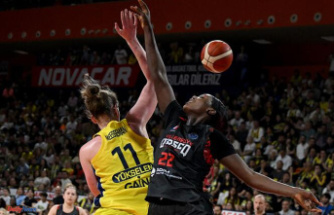The VAR drives a lot of fans crazy every week. Many controversial decisions remain controversial even after a possible review. And in any case, it always takes far too long. An annoyance that FIFA wants to fight with a technology revolution at the 2022 World Cup in Qatar.
The ruler can be thrown away, the annoying fast-forwarding and rewinding is a thing of the past: The world football association FIFA has decided on the next technological revolution and will use semi-automatic offside detection at the World Cup finals in Qatar (December 21 to 18). use. "The system is ready - and we are ready," said chief referee Pierluigi Collina: "All tests have been carried out to our complete satisfaction."
According to FIFA's plans, twelve so-called tracking cameras and a sensor in the ball will be used in every World Cup game, which together create a 3D animation. The data should reflect 29 points on the player's body and the exact time the ball was released. The signal to the video referee (VAR) is expected within five seconds. It should only take 25 seconds for the final decision to be made after a review by the VAR. After that, the animation should be visible on the video cube in the stadium and on TV.
"So far, it has taken an average of 70 seconds to check an offside decision, even with the best technology. The new technology means we are faster and more accurate. We needed that," said Collina: "We will continue to use our video referees in dealing with the "Teaching the technology. Two weeks before the World Cup, all the referees will be on site for the final touches. We assume that it will work as smoothly as with the goal-line technology."
The new technology, about the cost of which the world association is silent, was tested last year at the Arab Cup and in January at the Club World Cup. In addition, according to FIFA, the innovation was checked by several universities worldwide. The rule-keepers of the International Football Association Board (IFAB) have also given the green light.
"This technology is the result of three years of intensive research and testing to bring the best to the teams, players and fans in Qatar this year," said FIFA President Gianni Infantino. "FIFA is proud of this achievement and is delighted show the world the benefits of semi-automated offside technology at the World Cup."
Six years after the introduction of VAR, those responsible took another decision out of the hands of the referees. However, Collina vehemently denies that this is the end of the flesh-and-blood referees.
"The term 'robot referee' is perhaps well suited for headlines, but it has nothing to do with reality," said the 62-year-old Italian: "If only the technology were relevant, it would be better for an engineer to take over my job. Our main goal remains for the referee to make correct decisions on the pitch. But to err is human. That's when technology comes into play to prevent mistakes."
According to Collina, the VAR has proven that this system works. "50 countries have now introduced the technology - with great success," emphasized the former top referee: "The errors have been reduced dramatically, the game has become much cleaner."
It is still unclear whether and when the new offside technique will be used in the top international leagues such as the Bundesliga. Meanwhile, Collina announced that FIFA is currently working on a "VAR light" with fewer cameras and correspondingly lower costs in order to make the technology accessible to financially disadvantaged associations.












